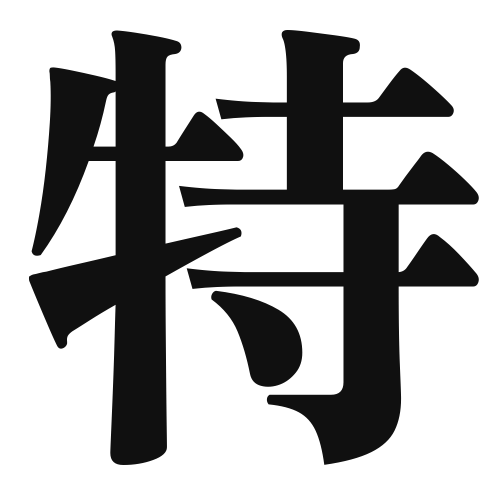1. Overview of Meaning
The kanji 特 (toku) means “special” or “particular.” It is used to indicate something that is distinct or exceptional in some way.
2. Formation and Radical
Formation of the Kanji: The kanji 特 is a phonetic-ideographic character (形声文字). It combines the radical for “special” (特) with the phonetic component that suggests its pronunciation.
Radical: The radical for 特 is 牛 (ushi), which means “cow.” This radical is often associated with meanings related to livestock or animals.
3. Examples of Usage
Common Words and Phrases: Some frequently used words that include 特 are:
- 特別 (tokubetsu) – special
- 特訓 (tokkun) – special training
- 特典 (tokuten) – special benefit or privilege
Example Sentences in Daily Conversation:
- この料理は特別です。 (Kono ryouri wa tokubetsu desu.) – This dish is special.
- 彼は特訓を受けています。 (Kare wa tokkun o uketeimasu.) – He is receiving special training.
4. Synonyms and Antonyms
Similar Kanji: A similar kanji is 特異 (tokui), which means “unusual” or “unique.” The difference lies in the nuance; 特 emphasizes being special, while 特異 suggests being out of the ordinary.
Antonyms: An antonym for 特 is 普通 (futsuu), which means “normal” or “ordinary.” This contrasts with the idea of being special.
5. Cultural and Historical Background
Relation to Japanese Culture: The concept of “special” is significant in Japanese culture, often associated with unique traditions, festivals, and customs that highlight the importance of individuality and distinction.
Proverbs and Idioms: One common saying is 特別な存在 (tokubetsu na sonzai), meaning “a special existence,” which reflects the value placed on unique individuals or experiences in society.
